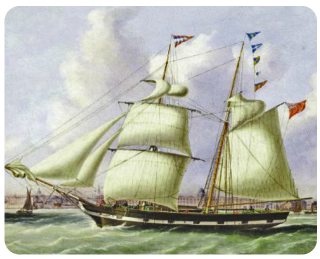Jersey is not to be regarded merely as an agreeable and fertile island. If we are to regard Jersey in its most important aspect, it is as a commercial community that we must regard it.
Shipping
It will probably surprise the reader to be told that there are no fewer than 232 vessels belonging to Jersey, with a tonnage reaching 21,000, besides nearly 500 large boats, upwards of 300 of which are employed in the oystery fishery. There are nearly 2,000 seamen employed in these vessels, besides at least another thousand who are engaged in the oyster fishery.
In the year 1833 there were more vessels built in the island of Jersey than in the whole of Ireland.
The commerce of Jersey may be divided into the following heads:
- Her trade with Great Britain and the British possessions abroad
- Her trade with North and South America, and with the Continent of Europe – unconnected with the former
- The transit of British manufactures to Newfoundland, New Brunswick, etc for the supply of the fisheries, and establishments there of the Jersey merchants, and the exportation from thence of fish, oil and furs, to the several ports of Europe and South America.
The peculiar privileges which Jersey by her charters enjoys are these. She is empowered to send all articles being the produce of the island to Britain, as British produce; and every description of merchandise, the growth, produce and manufacture of the island, to Great Britain and Ireland on the same footing.
She is also enabled to export every commodity, either the growth, produce or manufacture of the island, to the British colonies, the same as if they were British manufactured goods.
There is an important distinction between the term ‘growth, produce and manufacture’, and the term ‘growth, produce or manufacture’, for while by the former expression, the free exports of Jersey to Britain of manufactured goods must be not only the manufacture, but the produce also of the island, Jersey is entitled by the terms of the latter expression to export to the colonies, articles manufactured in the island, though of foreign produce.
Two examples are the importing of foreign flour, manufacturing it into biscuit, and exporting the biscuit, or provisioning ships with it; and the importing of French leather, making it into shoes, and exporting them to North America as Jersey manufactures.
Free port
Jersey is a free port: all articles of foreign produce, not contraband, being imported free of duty, a privilege which not only lessens the price of provisions to the inhabitants, but diminishes in an important degree the cost of ship building and outfit, and consequently acts as a stimulus to trade, and is a source of direct profit to the merchant.
Vessels are thus built with foreign timber, imported duty free, and rigged with foreign cordage, purchased at a cheap rate in Russia, yet Jersey vessels have the advantage of British registers, and consequently enjoy all the advantages in trade secured to British built vessels.
Jersey vessels load for a foreign port without the articles put on board being subject to examination; all that is required being a declaration that the articles so shipped are of British manufacture.
On the arrival of a vessel from a foreign port, she may commence unloading even at midnight, and half her cargo may be discharged, before an entry is made in the custom house, the Manifest Act never having been registered in the island.
Such are the commercial privileges enjoyed by Jersey it is no way wonderful that the trade of Jersey should have rapidly increased, and that the island should have made large advances in wealth and importance. Forty years ago the trade of Jersey was insignificant compared with what it now is; being then confined to the voyages of a few vessels to Newfoundland, and to the monthly trip of a cutter to Southampton.
Guernsey, even before that period, was in some degree known as a place of trade. But its notoriety was owing more to its illicit traffic in spirits and tobacco to the opposite ports of England than to the extent of fair and honourable dealings of its population as a mercantile community.
During the war, Jersey was not without her illicit dealings, and considerable fortunes were thus amassed by what was denominated the licensed trade Jersey vessels obtained licences to trade to French ports and bring back specified cargoes. Theses vessels immediately commenced unloading, no custom house officer being present, anhd the cargoes being sent direct to the merchant’s warehouse. Quantities of French silks were thus introduced and sent to England or elsewhere as opportunities offered.
Livestock
In 1810 and the three following years, there were exported from Jersey 61 bulls and 3,050 cows, heifers and calves; during the years ending with December 1832 the number was 53 bulls and 5,756 cows, etc. The whole of this export of cows is to England. The only other livestock exported from Jersey is pigs, but the number is limited, scarcely reaching the average of 120 yearly.
Imports
During the four years ending with 1832 there has been imported into Jersey from South America 2,167,347 lb of coffee, of which 1,542,250 lb were exported again to the Continent. The excess of coffee imported in the year 1832 over the quantity imported in 1831 was nearly 200,000lb.
During the above four years 2291 tons of raw sugar has been imported from the Brazils, of which 1055 tons have been re-exported. Large quantities of raqw sugar, the property of merchants of the island, has also been sent direct from the ports in South America to Hamburgh, Bremen, Antwerp and Petersburgh, in Jersey vessels, without being landed in the island.
